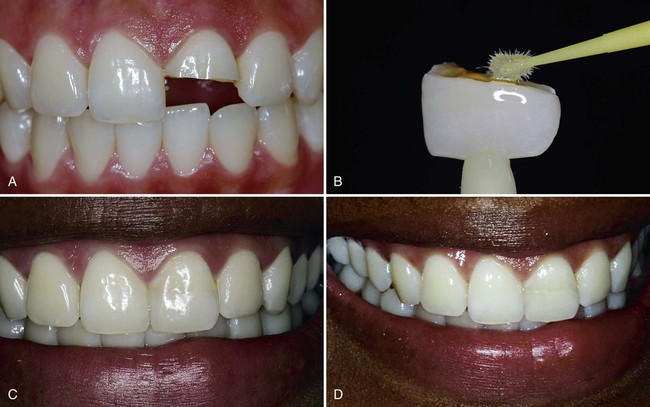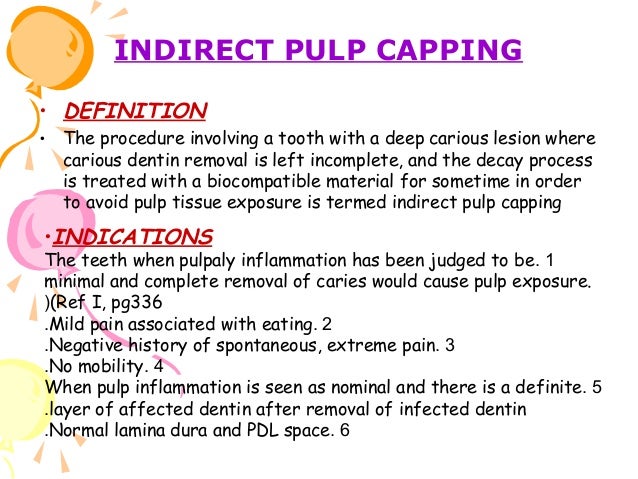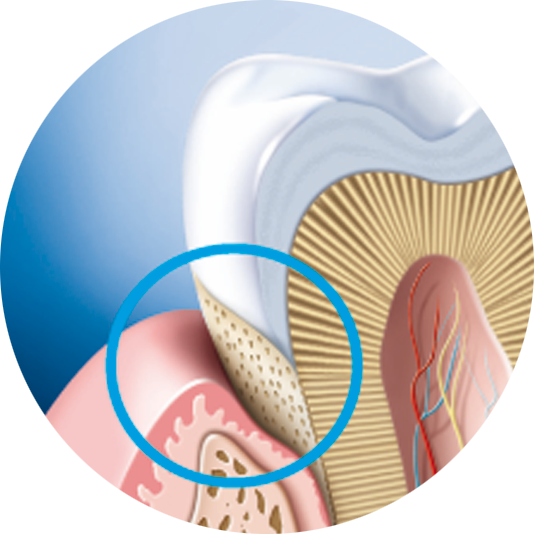
How do you restore dentin in your teeth? Overview. Minerals such as calcium and phosphate help make up tooth enamel, along with bone and dentin. Use fluoride toothpaste. Not just any toothpaste will work against demineralization. Chew sugarless gum. Consume fruit and fruit juices in moderation. Get more calcium and vitamins. Consider probiotics.
- Brush your teeth. ...
- Use fluoride toothpaste. ...
- Cut out sugar. ...
- Chew sugarless gum. ...
- Consume fruit and fruit juices in moderation. ...
- Get more calcium and vitamins. ...
- Consider probiotics. ...
- Address your dry mouth.
What's the best treatment method for exposed dentin?
Here are some best practices:
- Brush and Floss. Brush twice a day and floss daily. ...
- Be Gentle. Only use a toothbrush with soft bristles. ...
- Wear a Mouthguard. If you grind your teeth at night while you sleep, protect them from damage by wearing a mouthguard.
- Avoid Sugary and Acidic Foods and Drinks. ...
- Visit the Dentist Regularly. ...
Do teeth repair naturally?
Teeth can be regrown naturally. There are only two kinds of teeth that humans can grow: baby and adult. It is, however, impossible for them to regrow their teeth naturally. How Can I Regrow My Rotten Teeth? Throughout your life, your dentists, parents, and others have all told you that good oral hygiene is crucial.
Can dentin repair itself?
Dentin looks a lot like bone and contains thousands of microscopic tubules that are very susceptible to bacteria that can lead to cavities and tooth sensitivity. Dentin is alive and can heal itself if bacteria growth does not get out of control. Cementum: This is another substance that protects the dentin of a tooth.
Can your dentin heal?
Each tooth’s stem cells produce new dentin, in an attempt to repair the damage. However, this innate repair mechanism has its limits and can only manufacture small amounts of tissue while combating a cavity, injury, or infection. This is why, under normal circumstances, teeth cannot heal themselves.

Can you rebuild dentin?
Tooth enamel is incapable of self-repairing whereas dentin and cememtum can regenerate with limited capacity. Enamel and dentin are commonly under the attack by caries.
Can dentin decay be fixed?
If identified early, dentin decay may be treated with a filling. In more advanced cases, placement of a crown may be required. A crown is a covering that covers the top portion of your tooth above the gums (also called the crown of the tooth). The decayed area is removed before the crown is placed.
How do you treat dentin at home?
8 home remedies for pain reliefDesensitizing toothpaste. Desensitizing toothpaste contains compounds that help to shield nerve endings from irritants. ... Salt water rinse. ... Hydrogen peroxide. ... Honey and warm water. ... Turmeric. ... Green tea. ... Capsaicin. ... Vanilla extract.
How do I know if my cavity has reached dentin?
If you have a cavity that has reached the nerve tissue, you may experience some or all of the following symptoms:Toothache when pressure (such as chewing) is applied to the tooth.Tooth sensitivity to heat or cold.Discoloration of the tooth.Swelling or tenderness of the gums.
How can I rebuild my enamel naturally?
Demineralization and remineralization are interrelated and in constant flux.Brush your teeth. ... Use fluoride toothpaste. ... Cut out sugar. ... Chew sugarless gum. ... Consume fruit and fruit juices in moderation. ... Get more calcium and vitamins. ... Consider probiotics. ... Address your dry mouth.More items...
How does a dentist fix exposed dentin?
Surgical Treatments for Exposed Dentin In certain cases, surgical treatments will be necessary to cover the dentin. If you've lost gum tissue near the root, a surgical gum graft can help protect the root and reduce sensitivity. The last resort for exposed dentin is a root canal.
What helps exposed dentin?
Treating Exposed DentinDesensitizing toothpaste: Ask your dentist what toothpaste best blocks tooth nerve sensitivity. ... Fluoride gel: Your dental professional will administer this gel, which does double duty: It strengthens your tooth enamel and reduces teeth sensitivity.More items...
What does exposed dentin look like?
The remaining portion of dentin is made up of 10 percent water. If the enamel wears away and the dentin is exposed, the tooth will become quite sensitive. Take a look at exposed dentin and you will see it is yellow in color. Dentin is similar to bone yet it is not as hard as bone.
Can exposed dentin heal?
In certain cases, surgical treatments will be necessary to cover the dentin. If you've lost gum tissue near the root, a surgical gum graft can help protect the root and reduce sensitivity. The last resort for exposed dentin is a root canal.
Can you do veneers on rotten teeth?
No, veneers cannot be applied to decayed teeth. During your initial consultation for your veneers, your dentist will examine your teeth and carry out an x-ray to ensure there is no decay. If you wish to proceed with veneers, any decayed teeth must be removed or treated first.
Can dentin be whitened?
Changing the colour of the dentin involves methods of bleaching best undertaken by professional dental care providers. This can be done at the dentist with a peroxide gel or UV light treatment.
How can I redo my teeth?
We're going to go over 5 of the main ways your dentist can help you remake your smile after experiencing damage or tooth loss....Solutions for reclaiming your smile after damage or deterioration.Porcelain Veneers. ... Dental Resin Bonding. ... Porcelain or Metal Crowns. ... Porcelain or PFM Bridges.More items...•
Why does my dentin hurt?
One of the major reasons your dentin may become damaged is due to GERD (gastroesophageal reflux disease) or heartburn. When this acid comes back into your mouth from your stomach it’ll wear away your tooth’s enamel. Left unchecked, it can also eat through and damage your dentin.
What happens if you don't have dentin?
This can result in a significant amount of damage. If this isn’t what’s damaged your dentin, it may be that you have bacteria growing in your mouth, which will result in tooth decay.
Where is the dentin located?
June 15, 2019 By Mitchell Shapiro, DDS Leave a Comment. Dentin is the hard tissue that forms on your tooth. You should have plenty of this located under your tooth’s enamel (your tooth’s hard, outer layer). This is important because it is the second hardest layer of your tooth (second only to the enamel itself).
Why is the second layer of your tooth important?
This is important because it is the second hardest layer of your tooth (second only to the enamel itself). It’s responsible for protecting your tooth’s pulp ( the soft, inner part of your tooth).
Can dentin regenerate?
Unlike tooth enamel, which is incapable of repairing itself, your dentin can regenerate. Unfortunately, this will only happen within a limited capacity though. This is why you’ll want to talk to us when you’re having any issues with your dentin and any damage to it has occurred.
Who discovered that dentine is a secondary dentine?
In 1922 Dr. May Mellanby proceeded to investigate this phenomenon under varying nutritional conditions and found that she could control the secondary dentine laid down in the teeth of animals as a reaction to attrition both in quality and quantity, independently of the original structure of the tooth.”.
Where is Dentin found?
It is found just under the enamel, which is the cover of the tooth. Dentin is organic and can grow, enamel is inorganic but it can remineralize.) Amazingly this information is not new news. It was researched and discovered close to a century ago by the brilliant husband-and-wife team, the Mellanbys, in England.
How to rebalance pH in mouth?
Using bacterial strains that work to rebalance your mouth’s pH to healthy, non-acidic levels. Utilizing mineral supplementation that provides a form of calcium that is highly effective for remineralizing your enamel–making the surface dense,strong, and and resistant to breakdown.
Do probiotics help with dental decay?
Ongoing use of our oral probiotics can buffer the acids in your mouth, creating a more healthy alkaline environment, lower the levels of acid-producing “bad bacteria” and then boost the protective hardness of your enamel on a microscopic level… quite a one-two-three knock out punch to the chances of further dental decay .
Do probiotics help with cavities?
And, while advanced cavities and serious dental issues will require address by a dentist there is much that can be done to strengthen your teeth, support the healing process and fight off beginning stages of cavity formation.
Can you salvage teeth with crowns?
For years and years most people have adopted the idea that teeth are rather like stones in your mouth, once they begin to erode or decay (cavities and enamel loss) they are only salvageable by crowns and repairs, or implants and false teeth. Perhaps because teeth are hard, and so do not appear to have life, ...
Can teeth heal themselves?
These findings were validated in later studies by other researchers and while there is much that could be said about them the point to be made here is: The study demonstrated that teeth can heal themselves, when given the right nutrients and minerals, and when those minerals were not blocked from absorption.
How to prevent dentin exposure?
Prevention: This is where your oral health routine comes into play: Gently brush twice daily with fluoride toothpaste. Floss once a day. Schedule twice-annual dental checkups at which your dental professional examines your gums for any recession. Yep, it's that easy!
How to avoid dentin sensitivity?
The best way to avoid sensitivity due to dentin exposure is to prevent practices or conditions leading to enamel erosion. Luckily, for the most common causes of dentin exposure, there's a preventive measure.
What to do if you overbrush your gums?
Overbrushing is most troublesome along the gumline, where the enamel is thinnest. Prevention: If you're a vigorous brusher, switch to a soft-bristled brush or an electric toothbrush that alerts you when you brush too hard. Also, use non-abrasive toothpaste, one with a low Relative Dentin Abrasivity (RDA) number.
Why do teeth grind?
Cause of Exposure: Teeth grinding, also known as bruxism, can result from stress, malocclusion (a misaligned bite), or certain diseases affecting your muscles. Over time, grinding can lead to thinning enamel on your teeth's biting surfaces. Eventually, this thinning will cause the enamel to wear away, leaving the dentin exposed.
What is exposed dentin?
To understand why exposed dentin is a challenge to be solved, here's a mini-lesson on teeth: 1 Enamel is the outer layer of each tooth. It's sort of a superhero since enamel's the hardest substance in our entire bodies and helps protect us from tooth sensitivity. Yay for enamel! 2 Directly beneath enamel is the dentin layer. Though considerably softer than enamel, it supports your tooth's structure. (Hurray, dentin!) Dentin contains thousands of microscopic tubules with nerve endings connecting directly to the inner pulp of the tooth. 3 Dental pulp contains the nerve fiber that interprets everything as pain. Yikes!
What causes enamel erosion and tooth decay?
Cause of Exposure: When gastric reflux occurs, your stomach acid enter s your mouth, leading to enamel erosion and tooth decay. Prevention: By managing GERD, you can help prevent dentin exposure. Consult your doctor, who might recommend lifestyle changes, prescription or over-the-counter medicine, or surgery.
What is the best treatment for tooth sensitivity?
Fluoride gel: Your dental professional will administer this gel, which does double duty: It strengthens your tooth enamel and reduces teeth sensitivity. Dental crowns, inlays, or bonding: Your dentist might perform one of these procedures if your sensitivity results from decay or a dental imperfection.
How to prevent exposed dentin?
To prevent exposed dentin and tooth sensitivity: Use a soft-bristled toothbrush to protect your gums. Use desensitizing toothpaste to provide some relief and remove plaque. Avoid acidic foods and drinks (e.g. citrus fruits and juices).
Why does my dentin hurt?
Dentin exposure usually causes sensitivity or pain since the nerves can be easily stimulated. Heat, cold, and any kind of pressure can cause sensitivity to the exposed dentin on tooth.
What to do if your enamel is chipping?
If your teeth crack or chip, talk to your dentist immediately. This will help prevent further damage and other conditions such as exposed dentin and gum disease and infection.
What is the soft layer of the tooth called?
Dentin is a soft layer that is directly beneath the enamel of the teeth. It is filled with the innermost layer called pulp which contains microscopic tubules, or hollow tubes, containing nerve endings. Dentin becomes exposed when enamel, a strong layer that covers your dentin , wears down or the gum lines recede.
What happens if you chew too hard?
Hard Impact. If your teeth are impacted too hard, it could expose your dentin and the nerve endings in the tooth pulp. Hard impact commonly caused by pressing your teeth down on hard candies, ice, or chewing too hard wears down enamel.
What happens if you don't floss?
If you don’t floss thoroughly and frequently enough, plaque may accumulate along the edge of the gums where they meet your teeth. This could make the gum tissue recede away from the teeth, exposing dentin.
How to get rid of a bad tooth enamel?
These habits can recede your gums and weaken your enamel. Swish your mouth with clean water if you can’t brush or floss. This is a great hack for overseas flights and travel. After meals, clean your te eth by gently flossing and brushing. This prevents bacteria build-up that could erode enamel.
